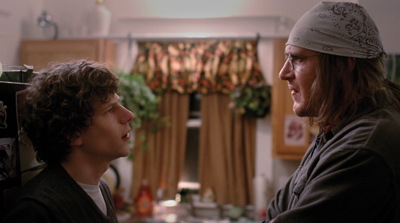David Foster Wallace made a brilliant (and all too brief) career out of relentless self-interrogation. That's readily apparent in his nonfiction essays, which are mostly written in the first person and frequently pause for the author to wonder aloud about his own motivations and inhibitions. But Wallace's fiction, too, conveys the unmistakable impression of an incredibly acute mind at war with itself. Characters are paralyzed by neuroses regarding how they're perceived. "He considered himself creepy when it came to dope," the narrator of Infinite Jest notes about a guy named Ken Erdedy, "and he was afraid that others would see that he was creepy about it as well." Read enough of Wallace's work and lines like these start to seem like not-so-veiled confessions. At the same time, though, it's clear that Wallace is well aware of the impression he's creating, and that he's expertly engineering, from truth, an image of disarming candor.
That paradoxical dynamic powers The End of the Tour, a new movie featuring David Foster Wallace as one of the main characters. That's an odd way to phrase it, perhaps, but this isn't a biopic. Rather, it's an adaptation of a memoir by another noted writer, David Lipsky, who accompanied Wallace on the final stop of the Infinite Jest book tour in early 1996. The interview was intended for a Rolling Stone profile, but the piece was never published; many years later, after Wallace committed suicide at age 46, Lipsky published a book-length account of their five days together, featuring the very Wallace-esque title Although of Course You End Up Becoming Yourself. The memoir is pretty much nonstop conversation, and so is The End of the Tour — just two writers talking to each other about their respective careers, pop culture, junk food and the potential pitfalls of Wallace speaking on the record about any of these things.
When the project was announced, most of the media chatter involved the casting of Jason Segel as Wallace. Segel has mostly played amiable doofuses (on TV shows like Freaks and Geeks and How I Met Your Mother, and in movies like Forgetting Sarah Marshall and The Muppets), and the thought of him as the ultra-cerebral Wallace seemed borderline absurd. Thing is, though, Wallace didn't want to come across in the interview as ultra-cerebral. Much of the movie consists of his efforts to sell himself as a regular guy, while Lipsky (Jesse Eisenberg) tries to make him discuss what it's like to be extraordinary. He waxes rhapsodic about Die Hard and talks earnestly about how he wishes he could parlay his literary fame into a date with Alanis Morissette, and while he's not being dishonest, there's a sense in which he's being disingenuous — providing the profile he wants Lipsky to write. Segel captures that reasonably well, while doing a decent impression of Wallace's vocal and physical mannerisms. (The trademark bandanna helps.)
As shaped by screenwriter Donald Margulies, however, the conversation itself isn't terribly interesting, especially compared to the profound variations on this mental tug-of-war that animate Wallace's writing. Eisenberg, who's never afraid of looking unlikable, makes Lipsky something of a brown-nosing opportunist, fueled by professional envy. But he never succeeds in creating a character who feels like Wallace's equal in terms of dramatic stature. Consequently, The End of the Tour sometimes plays like a feature-length version of an actual, ordinary interview — the kind in which the celebrity is polite and accommodating but distant, and who cares about the person asking the questions? (Well, journalists do, and the film has received raves from many critics who may well have been in Lipsky's shoes at some point.) It's tough to make those interviews compelling for five minutes, much less for nearly two hours. The metatextual aspect helps, but not nearly enough.
One spark briefly looks as if it might ignite something. Wallace and Lipsky have dinner with two of Wallace's friends; when Lipsky makes a quip at the end of the night, one friend laughs and remarks, "That sounds like something Dave would say." "Doesn't it?" Wallace asks, an edge in his voice. Oddly, though, director James Ponsoldt (The Spectacular Now) chooses not to make Wallace very visible at this moment — the exchange is so visually undistinguished that it could easily be missed.
The End of the Tour never delves further into any resentment Wallace might feel about Lipsky's perhaps unconscious imitation. (A scene in which Lipsky hurriedly takes notes on everything in Wallace's house while Wallace is outside might qualify, but it'll only resonate for viewers who are familiar with Wallace's work and know that it's characterized by an almost obsessive attention to detail.) Instead, there's a confrontation in which Wallace angrily accuses Lipsky of hitting on his ex-girlfriend, which might have really happened, but is no less banal even if it did. Ultimately, this movie feels like an endnote to the career of a writer known for his endnotes — not without interest, but decidedly supplementary.
Email arts@nashvillescene.com





